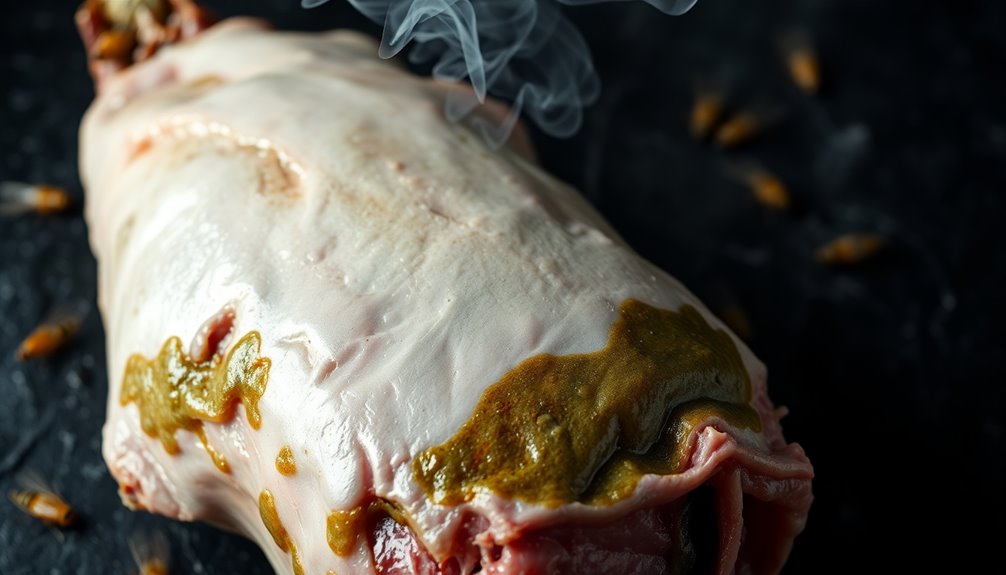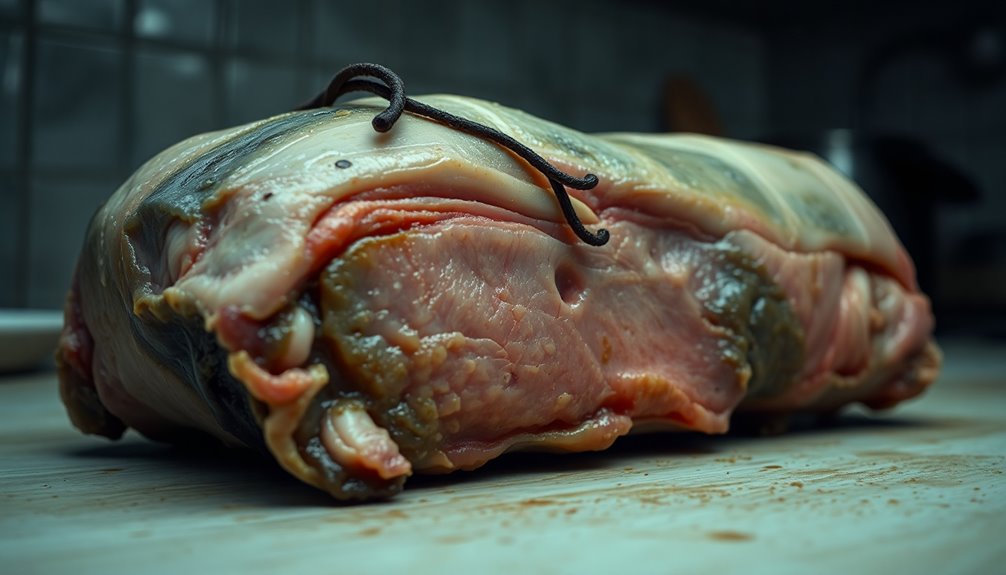Spoiled pork's smell is unmistakable. It gives off a strong, sour odor that signals bacterial growth and spoilage. If you notice an ammonia-like scent, that's even worse, indicating decomposition. Fresh pork should smell mild and meaty. If you catch any strong or persistent bad smells, it's a red flag. Rinsing might temporarily mask the odor, but it won't guarantee the meat's safety. Trust your nose—if it smells off, toss it. Your health's at risk, and there's plenty more to learn about how to properly handle and assess your meat.
Key Takeaways
- Spoiled pork typically emits a strong sour odor, indicating bacterial growth and spoilage.
- An ammonia-like scent suggests decomposition and the presence of harmful bacteria.
- Fresh pork should have a mild, meaty scent; strong smells are a warning sign.
- Cooking spoiled pork often amplifies unpleasant odors, making it unappetizing.
- Persistent bad smells after rinsing indicate spoilage and make the pork unsafe to consume.
Introduction

When you encounter spoiled pork, the smell can be unmistakable and alarming. You might notice a strong sour odor or an ammonia-like scent that signals bacterial growth and spoilage. Fresh pork, on the other hand, should have a mild, meaty scent that's pleasant and inviting. Any bad smell coming from the meat is a clear sign of spoilage, and it's crucial to trust your senses.
Assessing the odor before you cook is vital for food safety. If that unpleasant odor lingers even after rinsing, it's best to err on the side of caution and discard the meat. Remember, the smell of pork can intensify during cooking, which could make it even more difficult to determine its freshness.
It's also worth noting that odor changes can occur due to packaging processes. Vacuum-sealed or cryovac products can sometimes develop strong off-odors from trapped gases. Always be vigilant about these signs of spoilage to ensure you're consuming safe, fresh pork. Your health is worth the extra attention!
Description of the Smell

Spoiled pork often releases an overpowering, sour odor that's hard to miss. This strong odor typically indicates the presence of harmful bacteria and spoilage. As you approach the meat, you might notice it smells sour, almost like vinegar, which is a clear sign that it's no longer safe to consume. Additionally, a rancid odor can emerge, making it even more unpleasant and alarming.
If you've ever cooked spoiled pork, you know that the unpleasant smells intensify during the cooking process, further confirming your suspicions. Fresh pork should have a mild, meaty scent, while any pungent or off-putting smells signal that it's time to dispose of the meat.
To test for spoilage, you can rinse the pork before cooking. If a bad smell persists even after rinsing, it's a strong indicator that the meat has gone bad and should be discarded. Trust your senses—if it smells sour, rancid, or otherwise off, don't take the risk of consuming spoiled pork. Your health is worth more than a potentially harmful meal.
Source and Composition

The unpleasant odors associated with spoiled pork stem from the growth of harmful bacteria and the breakdown of proteins. You'll typically notice a strong, sour odor or an ammonia-like smell, which arises as bacteria multiply and release volatile compounds. One of these compounds is hydrogen sulfide, which can create an odor reminiscent of sewage, particularly in vacuum-sealed or cryovac packaged meats.
As you store pork for longer periods, especially in freezing conditions, off-odors can intensify due to the formation of sulfur compounds. This means that even if the meat appears okay, the smell can betray its true state. When you cook spoiled pork, these unpleasant odors often become even more pronounced, making the dish unappetizing.
If you're trying to salvage some freshness, rinsing the pork before cooking might help reduce the odors momentarily. However, if you notice a persistent bad smell afterward, it's a strong indicator that the pork has spoiled. Remember, it's always better to err on the side of caution when it comes to meat safety.
Typical Scenarios or Environments

Storing pork in environments with fluctuating temperatures can lead to spoilage, making it crucial to monitor your meat carefully. For instance, if you keep raw meat in a warm kitchen or near a heat source, it's more prone to going bad. Spoiled pork typically emits a sour or rancid odor, which should grab your attention immediately. In some scenarios, you might notice ammonia-like smells, indicating bacterial activity that poses health risks.
When pork starts to spoil, you might also observe signs of spoilage, such as discoloration or a slimy texture. These visual cues often accompany the unpleasant odors that develop as the meat decays. If you've vacuum-sealed your pork, be cautious; spoiled pork can release smells resembling rotten eggs or sewage due to sulfur compounds reacting.
Lastly, if you cook this spoiled meat, expect the odors to intensify, further confirming it's no longer safe for consumption. Always trust your senses—if you detect any foul odor or see any signs of spoilage, it's best to discard the meat rather than risk foodborne illness.
Emotional or Cultural Associations

A pungent whiff of spoiled pork can stir deep emotional reactions, often evoking feelings of disgust or unease. This smell is closely tied to food safety and the fear of foodborne illnesses. If you've ever experienced food poisoning, the scent might trigger vivid memories of that discomfort, enhancing your emotional response.
Cultural perceptions play a significant role here, too. In many communities, the odor of spoiled pork symbolizes a breach of trust in food handling practices. When dining together, a bad smell can lead to social stigma, affecting how you and others perceive culinary traditions. It's fascinating how some cultures may view the odor as negligence, while others stress the importance of proper cooking and preservation techniques.
The strong, unpleasant scents of spoiled pork can even influence communal dining habits, prompting groups to adopt stringent freshness criteria and waste reduction strategies. Ultimately, your emotional responses to spoiled pork aren't just personal; they're woven into the fabric of your cultural experiences, reflecting broader attitudes toward food safety and trust in food handling.
Health or Safety Considerations

When pork smells off, it's crucial to take immediate action, as that unpleasant odor often signals spoilage. Spoiled pork typically emits a sour odor, indicating significant bacterial activity. Consuming it can pose serious health risks, including foodborne illnesses like trichinosis. If you notice strong, ammonia-like smells, it's a clear sign that the pork has gone bad.
Cooking spoiled pork might not eliminate harmful bacteria or their toxins, which increases the risk of food poisoning. Trusting your senses is vital; if the pork smells bad, you could face nausea, vomiting, diarrhea, and other severe symptoms. Even rinsing the meat won't guarantee safety if the off-putting smell persists. In such cases, it's best to discard the pork to avoid potential health hazards.
Always prioritize safety considerations when handling meat. If you're ever in doubt, err on the side of caution. It's not worth jeopardizing your health for a meal. Remember, spoiled pork can lead to serious consequences; if you encounter any foul odors, don't take chances—dispose of it immediately.
Final Thoughts

It's important to remember that your senses play a vital role in ensuring food safety, especially with pork. When you encounter spoiled pork, you'll likely notice a strong, sour, or ammonia-like odor. This smell indicates the presence of bacteria and potential spoilage, which makes the meat unsafe to consume. Fresh pork should have a mild, meaty scent, so any off-putting odor is a clear warning sign.
If you're uncertain, rinsing the pork might help determine if the smell is just from packaging. However, if a bad odor persists after rinsing, it's best to discard the meat. Cooking spoiled pork can intensify these unpleasant odors, further confirming its unfitness for consumption.
Trusting your sense of smell is crucial; strong, pungent odors often result from fermentation or decay, both of which pose significant health risks if ingested. Always prioritize your safety and well-being in the kitchen. By being vigilant and relying on your senses, you can avoid the dangers of spoiled pork and ensure that what you serve is not only delicious but also safe to eat.
Frequently Asked Questions
How Do You Tell if Pork Is Spoiled?
To tell if pork is spoiled, trust your sense of smell first. Fresh pork has a mild scent, while spoiled pork often has a strong, sour, or ammonia-like odor. Check the color and texture too; if it's slimy or discolored, it's likely gone bad. If you've rinsed it and the bad smell persists, don't risk it—discard the pork. It's better to be safe than to consume spoiled meat.
Is Pork Ok if It Smells a Little?
If pork smells a little off, it's best to be cautious. A faint meaty scent is normal, but anything strong or sour usually means spoilage. You might think rinsing might help, but it won't fix the underlying issue. Trust your instincts—if the odor lingers, don't take the risk. It's safer to discard it rather than potentially face foodborne illness. Always prioritize your health and safety when it comes to consuming meat.
Does Rotten Pork Smell Like Eggs?
Yes, rotten pork can smell like eggs, particularly a strong odor reminiscent of rotten eggs. This smell usually comes from hydrogen sulfide gas produced by bacteria as the meat spoils. If you notice this odor, it's a clear sign that the pork has gone bad and isn't safe to eat. Always trust your senses—if it has an off smell, it's best to discard it to avoid any health risks.
What Are the Symptoms of Bad Pork?
If you eat bad pork, you might experience several uncomfortable symptoms. You could start feeling nauseous, and vomiting often follows. Diarrhea is another common issue, leaving you feeling weak and fatigued. Sometimes, people also report stomach cramps or a general feeling of unease. It's crucial to pay attention to these signs, as consuming spoiled meat can lead to serious foodborne illnesses that might require medical attention. Always trust your instincts!









